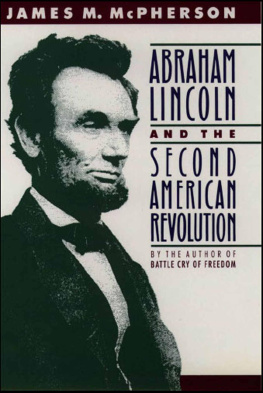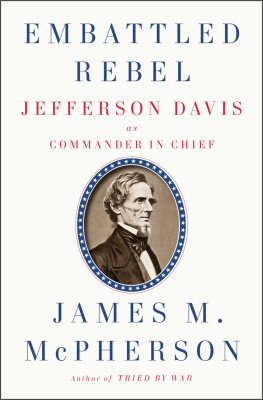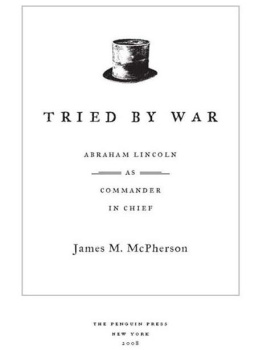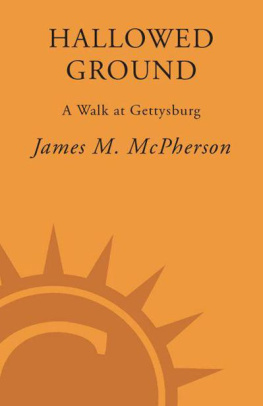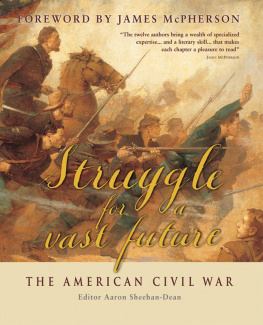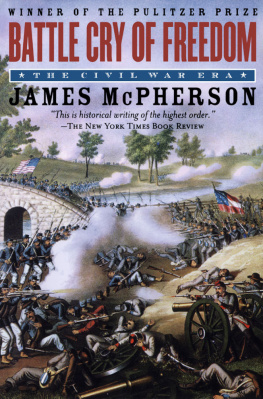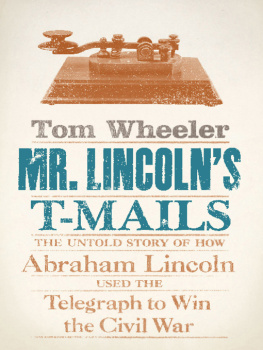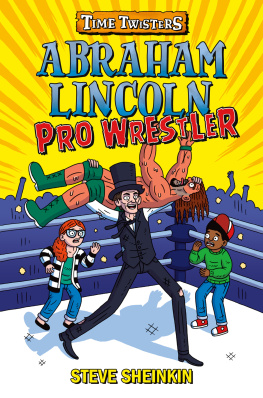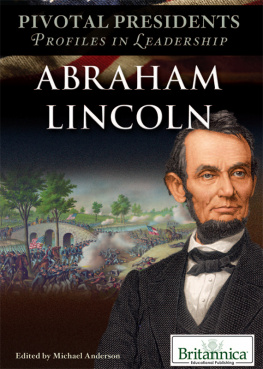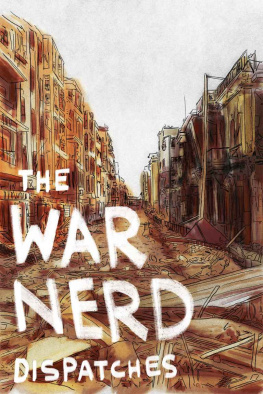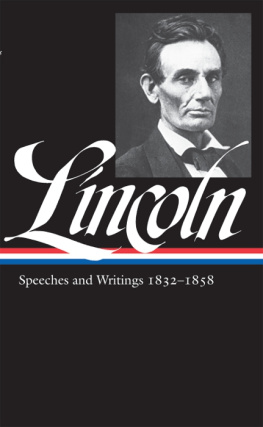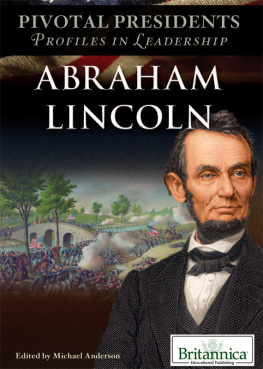Abraham Lincoln
and the Second American Revolution
ABRAHAM
LINCOLN
and the Second American Revolution
JAMES M.McPHERSON

Oxford University Press
Oxford New York Toronto
Delhi Bombay Calcutta Madras Karachi
Kuala Lumpur Singapore Hong Kong Tokyo
Nairobi Dar es Salaam Cape Town
Melbourne Auckland
and associated companies in
Berlin Ibadan
Copyright 1991 by James M. McPherson
First published in 1991 by Oxford University Press, Inc.,
198 Madison Avenue, New York, New York 10016-4314
First issued as an Oxford University Press paperback, 1992
Oxford is a registered trademark of Oxford University Press
All rights reserved. No part of this publication may be reproduced,
stored in a retrieval system, or transmitted, in any form or by any means,
electronic, mechanical, photocopying, recording, or otherwise,
without the prior permission of Oxford University Press, Inc.
Library of Congress Cataloging-in-Publication Data
McPherson, James M.
Abraham Lincoln and the Second American Revolution
James M. McPherson.
p. cm. Includes bibliographical references.
1. Lincoln, Abraham, 18091865Military leadership.
2. United States-History-Civil War, 18611865lnfluence.
I. Title. E457.2.M4758 1991
973.7'092-dc20 906885
ISBN 019505542X
ISBN13 9780195076066
ISBN 0195076060 (pbk.)
20 19 18 17
Printed in the United States of America
To Pat and Jenny
with love and appreciation
Preface
Four years after the guns fell silent at Appomattox, Harvard historian George Ticknor reflected on the meaning of the Civil War. That national trauma had riven a great gulf between what happened before in our century and what has happened since, or what is likely to happen hereafter. It does not seem to me as if I were living in the country in which I was born.
Ticknor had been born in 1791, during the third year of George Washingtons presidency, in a country still basking in the glow of the Revolution that had given it birth. He had lived through eighteen presidential administrations and a Second American Revolution that gave the United States a new birth of freedom during the administration of its sixteenth president. This is a book about that president and the revolution he led, which so utterly transformed the nation that George Ticknor could scarcely recognize it. Nor could a Louisiana planter who returned home after four years as an officer in the Confederate army to discover that society has been completely changed by the war. The [French] revolution of 89 did not produce a greater change in the Ancien Regime than has this in our social life.
Abraham Lincoln was not Maximilien de Robespierre. No Confederate leaders went to the guillotine. Yet the Civil War changed the United States as thoroughly as the French Revolution changed that country. The liberation of four million slaves, along with destruction of the Souths political domination of national affairs and of the social order on which that domination was founded, metamorphosed a region (the former slave states) more than three times as large as France. The future of America after 1865 belonged to a system of democratic free-labor capitalism, not one of slave-labor plantation agriculture. The House Divided of 1858 was no longer divided. Liberty took on new meanings for Americans. The old decentralized federal republic became a new national polity that taxed the people directly, created an internal revenue bureau to collect these taxes, expanded the jurisdiction of federal courts, established a national currency and a national banking structure.
The United States went to war in 1861 to preserve the Union; it emerged from war in 1865 having created a nation. Before 1861 the two words United States were generally used as a plural noun: the United States are a republic. After 1865 the United States became a singular noun. The loose union of states became a nation. Lincolns wartime speeches marked this transition. In his first inaugural address he mentioned the Union twenty times but the nation not once. In his first message to Congress, on July 4, 1861, Lincoln used the word Union thirty-two times and nation only three times. But in his Gettysburg Address two and one-half years later, the president did not mention the Union at all but spoke of the nation five times to invoke a new birth of freedom and nationhood. And in his second inaugural address on March 4,1865, Lincoln spoke of the South seeking to dissolve the Union in 1861 and the North accepting the challenge to preserve the nation.
The seven essays that follow examine these events from several perspectives. The first and last analyze the scope and meaning of revolutionary transformations in both substance and process wrought by the Civil War. The other five treat various aspects of Lincolns leadership in accomplishing these changes. The essays originated as lectures or papers to audiences ranging from fellow historians to that indistinct but real entity, the general public. Each essay can stand alone and be read separately. They also cohere in a pattern that develops variations on the two themes expressed in the title. Because they examine different facets of these themes, looking at them from one angle and then another to catch different qualities of light, the careful reader of all seven essays may discern slight overlaps in evidence and interpretation. In revising the essays for this volume, I have tried to eliminate unnecessary duplication among them while retaining enough substance in each that it can stand on its own. I hope that readers will find new insights in each essay and will also conclude that the whole equals the sum of its parts.
More than thirty years ago, historian David Herbert Donald noted the compulsion that American public figures feel to get right with Lincolnto square their own position with what they suppose Lincoln would have done in similar circumstances, or to find a Lincoln quotation that allegedly supports their present attitude on almost any issue under the sun. I have had personal experience with this remarkable hold that Lincoln has on the American imagination. On the 175th anniversary of Lincolns birth in 1984, I delivered a version of the title essay of this volume to the Lincoln Club of Delaware, whose members included the governor, the chief justice of the state supreme court, and other political leaders. After my talk, a reporter for a Wilmington radio station taped an interview with me. His first question was: If Lincoln were alive today, what position would be take on abortion and the budget deficit?
I do not pretend to know where Lincolns philosophy of libertythe subject of one of the essays in this bookwould The issues that Lincoln grappled with will never become obsolete: the meaning of freedom; the limits of government power and individual liberty in time of crisis; the dimensions of democracy; the nature of nationalism; the problems of leadership in war and peace; the tragedies and triumphs of a revolutionary civil war. I hope the essays that follow will focus fresh light on these matters.
James M. McPherson
Princeton
March 1990
Acknowledgments
It is a pleasure to acknowledge the encouragement, assistance, and constructive criticism of the following individuals who invited me to deliver lectures or papers that constituted the initial versions of these essays, or offered suggestions for their improvement: Michael Les Benedict of the Ohio State University; Gabor Boritt of Gettysburg College; LaWanda Cox of Hunter College; Richard N. Current of the University of North Carolina at Greensboro; Don E. Fehrenbacher of Stanford University; Leslie H. Fishel of the Rutherford B. Hayes Presidential Center; Maldwyn Jones of University College, London; Robert Kaczorowski of Fordham University Law School; Mark E. Neely, Jr., of the Louis A. Warren Lincoln Library and Museum; Peter Parish of the Institute of American History in London; John Phillip Reid of the New York University Law School and the Huntington Library; Martin Ridge of the Huntington Library; Thomas F. Schwarz of the Abraham Lincoln Association; Lawrence Stone of the Shelby Cullom Davis Center at Princeton University; John L. Thomas of Brown University; and Frank J. Williams of the Abraham Lincoln Association. I am especially grateful to the Center for Advanced Study in the Behavioral Sciences at Stanford and the National Endowment for the Humanities, and the Henry E. Huntington Library in San Marino and the Seaver Institute, which provided wonderful facilities and financial support for two sabbatical years in California during which part of the research and writing of these essays went forward. A week's sojourn in London as the Commonwealth Fund Lecturer in American History also offered stimulating feedback on some of the ideas that appear in this book. Members of the Shelby Cullom Davis Center at Princeton University and of the Symposium on Emancipation and Its Aftermath sponsored by the Graduate Center of the City University of New York make useful criticisms and suggestions. Sheldon Meyer and Leona Capeless of Oxford University Press have expertly guided the book through the publication process. My wife Patricia McPherson has, as always, given of her love and endured in patience while sitting through the lecturessometimes more than oncethat with her help and advice eventually matured into the essays that follow.
Next page
